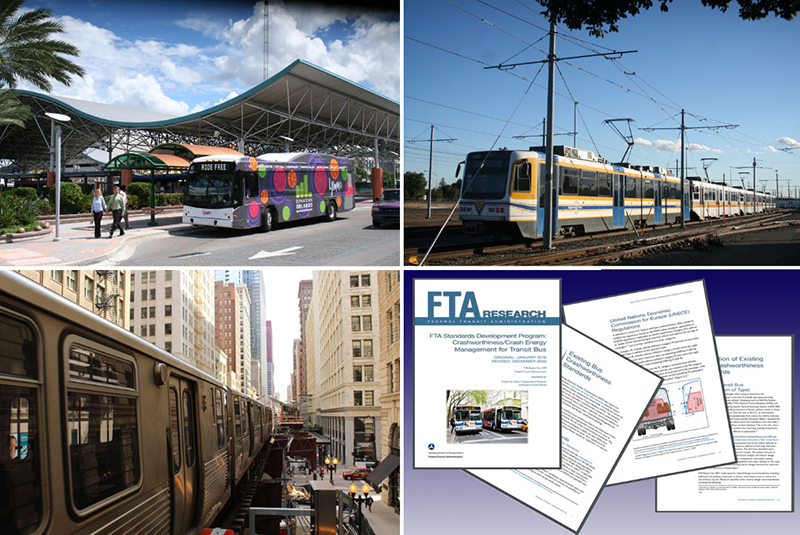Standards Development Program

What's New
- On August 9, 2024, FTA posted Mobility Data – Standards and Specifications for Interoperability (Report 0267) that presents a comprehensive global literature search on the interoperability of mobility services, including taxonomies, definitions, and the current state of mobility services.
- On September 14, 2023, FTA provided a link to Mobility Standards and Guidelines Resources (MSGR) tool. This tool was developed with the goal of providing information on available standards, open-source specifications, and case studies associated with the interoperability among various components of the Mobility on Demand (MOD)/Mobility as a Service (MaaS) ecosystem.
- On August 4, 2023, FTA announced the selection of a multi-organizational team led by the American Public Transportation Association (APTA) and Center for Urban Transportation Research (CUTR) to carry out the new FTA Standards Development Program. The goal of the new standards program is to develop voluntary standards, best practices, guidance, and tools for the transit industry. Transit standards enable transit agencies to benefit from new technologies and operate their systems consistently and efficiently, and ensure manufacturers meet specific performance criteria, including safety, operation, maintenance, interoperability, and data integration. The project has begun with APTA and CUTR performing broad engagement and assessment of industry needs, evaluation, and prioritization to identify current and future priorities for new standards development.
Overview
The Standards Development Program (SDP) seeks to develop meaningful transit standards, including minimum performance standards and best practices for efficient, reliable, and safe operation of public transportation systems, both rail and non-rail modes.
The goals of FTA’s SDP are to:
- Determine the need to revise or expand existing transit standards due to innovation and technological advancements
- Determine the need for new transit standards in areas where standards are lacking or where there are gaps within existing standards
- Work with the transit industry to develop and implement safety and other standards and best practices
The primary objectives of the SDP are to:
- Conduct background literature review, data gathering and analysis to determine gaps and needs for standards development
- Work with industry stakeholders to inform the standard development process, including associated transit research reports and findings
- Work with Standard Development Organizations (SDOs) to develop guidance documents, standards, or recommended practices for voluntary adoption by the transit industry
Eligible Activities
In accordance with Federal public transportation law (U.S.C. § 5314(a)(1)(B)), activities may include technical assistance and the development of voluntary and consensus-based standards and best practices by the public transportation industry. This includes standards and best practices for safety, fare collection, intelligent transportation systems, accessibility, procurement, security, asset management to maintain a state of good repair, operations, maintenance, vehicle propulsion, communications, and vehicle electronics.
The SDP provides funding for background literature review, analysis, testing, and evaluation of industry critical topic areas, in accordance with Federal public transportation law (U.S.C. § 5314(a)(1)(B)). SDP program funds are used to advance FTA’s standards program through targeted technical assistance and the support activities indicated above in safety and non-safety topic areas to determine if standards should be developed or if existing standards should be modified to address these topic areas. Eligible activities also include the development of public transportation standards in partnership with the transit industry and SDOs.
The SDP does not include funding for capital procurements.
Eligible Recipients
Eligible project partners and sub-recipients may include, but are not limited to:
- Public transportation systems
- Private for-profit and nonprofit organizations, including technology system suppliers and bus manufacturers
- Operators of transportation, such as employee shuttle services or airport connector services or university transportation systems
- State or local government entities
- Other organizations that may contribute to the success of the project team including consultants, research consortia or nonprofit industry organizations, and institutions of higher education
- Standard Development Organizations
Statutory References
Technical Assistance and Workforce Development (49 U.S.C. § 5314(a)(1)(B))
Allocation of Funding
Standards Development Program projects are funded under Technical Assistance and Workforce Development (49 U.S.C. § 5314).
Selected Project
American Public Transportation Association (APTA)
Resources
- In calendar years 2021-23, FTA published the following reports under the Standards Development Program:
- In keeping with a mandate from the Fixing America’s Surface Transportation (FAST) Act, FTA developed an inventory of public transportation safety standards and protocols. The inventory is available in the Transit Safety Standards Compendium.
- Review and Evaluation of Public Transportation Safety Standards (0103)
